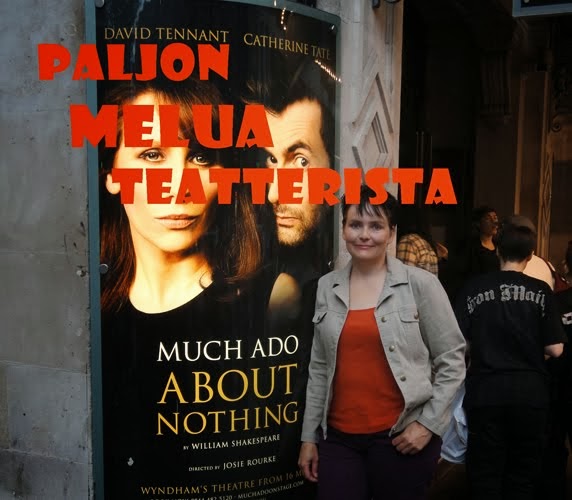This winter, three very different actors star in three very different plays - Richard II, Henry V and Coriolanus. But who was best?
No, koska olen kaikki nähnyt lavalla, Richard II jopa kahdesti (ja ensi viikon jälkeen toivon mukaan 2 muutakin toistamiseen) niin voin osallistua tähän keskusteluun varsin helposti :-). Katsotaanpa... Juttu julkaistiin 16.12. ja kirjoittaja Helen Lewis piti kaikista kolmesta näytelmästä, kuten sivumennen sanoen minäkin.
Kaikki 3 näytelmää käsittelevät johtajuutta, tavalla tai toisella. No, mitä muuta yhteistä niillä on? Tai lähinnä, niiden pääosanesittäjillä Hiddlestonilla, Law'lla ja Tennantilla.
All three are fine stage actors but they are also “stars”: the A-lister, the telly favourite and the young pretender, fresh from playing Loki in the Avengers film. (It is entirely unsurprising, although still exciting, that Benedict Cumberbatch will be giving us his Hamlet in 2014.) This new “golden age” of Shakespeare is also a golden age of thirtysomething and early fortysomething actors “doing a hero” alongside their more commercial work, in a kind of mid-career seriousness test.
Tennantilla on vaikein rooli, koska Richard II ei ole kovin pidetty henkilö tai suosittu kuningas. Miten saadaan yleisö kuitenkin pitämään epämiellyttävästi käyttäytyvästä päähenkilöstä?
Tennant plays this casual cruelty like a spoiled child – reminding us that being a king is very like being a toddler and it’s not good for anyone never to be told “no”.
The costume design helps, too, by creating a feeling that Richard’s character is out of place in his own time: this spoiled child lives in a world of tough men. Nigel Lindsay’s bullet-headed Bolingbroke is – like almost all the other male characters – clad in chain mail, while Tennant wafts round the stage in a series of flowing gowns, waving his long arms expressively and wearing elbow-length hair extensions that look like they were harvested from Neil in The Young Ones.
After Bolingbroke takes his crown, Richard achieves a different type of nobility in accepting his fate, and Tennant does this exquisitely. The metaphorical wobbly lip has always been his strength: from Blackpool to Doctor Who to Recovery, he’s probably made British television viewers cry more than any other actor working today.
Kyllä mä ainakin olin ihan myyty, ja symppasin ressukkakuningasparkaa ihan täysillä. Ja ihan samaa mieltä, Tennant osasi mestarillisesti heittäytyä tuohon reppanan rooliin. (Mutta toisaalta, niin osasi kyllä Ben Whishawkin. Mua harmittaa ihan kauheasti että muutaman vuoden takainen Donmarin versio Richard II (pääosassa Eddie Redmayne) ei ole missään nähtävillä.).
Verrattuna Tennantin taakkaan, Jude Law'lla on suht helppo sarka. Koska KAIKKI rakastavat Henry V:tä jo valmiiksi :-)
Mutta. Mä olen NIIN samaa mieltä kirjoittajan kanssa tästä:
There’s nothing wrong with this production: the whitewashed set is elegant, the costumes gesture to the period without looking ridiculous to modern eyes (Law’s slim-fit trousers have just a whisper of codpiece about them). The performances are uniformly well-judged, with Ron Cook’s swaggering Pistol and Jessie Buckley’s unexpectedly funny Katherine particular highlights.
And yet: it all left me strangely cold. If Tennant’s Richard II is a man out of his time, then perhaps Henry V is a man out of ours. There is no discussion about why the king, already ruler of one country, is desperate to acquire another. (Also, the French king seems like a decent sort, albeit with a striking resemblance to Top Gear’s James May.)
Tämä on NIIN totta. Vaikka mä rakastan tätä näytelmää yli kaiken, ja se oli oikein hyvä, niin silti se oli jotensakin vaisu. Kuten jo olen kirjoittanutkin.
Ja lopulta tullaan Coriolanukseen, joka on näistä ehkä näytelmänä vaikein (ja myös vähiten esitetty).
The tragedy of Caius Martius Coriolanus – and this play is a tragedy, not a history – is that the same stubborn pride that makes him a war hero prevents him from succeeding as a politician. Back in Rome, he cannot win over the plebs, nor the tribunes who represent them, and ends up cast out of the city as a traitor. So, he teams up with his old enemies, the Volsci, who agree to follow Coriolanus because their commander, Aufidius, has been having sexy dreams about him – and frankly who can blame him:
I have nightly sinceAhem. You get the idea.
Dreamt of encounters ’twixt thyself and me;
We have been down together in my sleep,
Unbuckling helms, fisting each
other’s throat . . .
Hmmm... Ehkä tässä jutun kirjoittaja, sekä tämän blogin pitäjä, harhautuivat hetkeksi ihan toisaalle... Mutta siis...
Komppaan taas tässäkin, eli koska teksti ja tarina ei ole luultavasti monellekaan katsojalle se ihan tutuista tutuin, niin joutuu keskittymään tekstiin enemmän. Ja:
It’s my guess that very few theatregoers (even ones as luvvie-loving as the Donmar crowd, who seemed to be very excited about “the woman from Borgen” being in it) will be familiar with the story of Coriolanus, and that has the happy effect of making the play more enjoyable, not less. Forced to concentrate on the verse to follow the plot, you find that the language shines.
Mutta kuka sitten lopulta voittaa tämän kolmen näytelmän kamppailun? Jos nyt ylipäätään on mahdollista laittaa niitä järjestykseen. Mulla olisi myös sama lopputulos, suureksi ihmeekseni!
All three of these plays are sold out, or close to it, for their full runs; and deservedly so. We are at a lucky moment when there are actors around who can charm us as a floppy-haired Timelord or a helmet-helmed Norse god and also do justice to 16th-century verse. But if you can beg, borrow or plunder a ticket to one of these plays, let it be Coriolanus. The weak leader and the strong one are interesting in their own ways; but it is the leader who is both, each at the wrong moment, who seems the most real.
Tietenkin kokonaisvaltaisesti hyvän näytelmän lisäksi myös Tom Hiddleston vakuutti mut ainakin ihan hirveän voimakkaalla läsnäololla (mikä jäi vähän puuttumaan Jude Law'lta). Tietenkin Donmarin pienuus ja intiimiys auttoi tähän.
Koko tämä hauska ja erinomainen juttu luettavissa New Statesmanin sivuilta.
Kuvien copyright RSC,Michael Grandage Co/Noel Coward Theatre, Donmar Warehouse




Ei kommentteja:
Lähetä kommentti